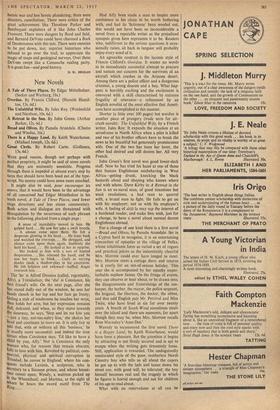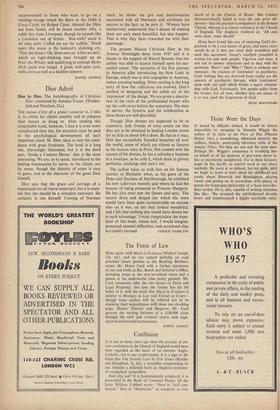New Novels
There is a Happy Land. By Keith Waterhouse. (Michael Joseph, 12s. 6d.) WITH good reason, though not perhaps with perfect propriety, it might be said of some novels that they are eminently weedable. Progress through them is impeded at almost every step by tares that should have been hoed out of the type- script. No enemy could have sown more mischief.
It might also be said, pour encourager les atttres, that it would have been to the advantage of all concerned had Edgar Mittelholzer in his tenth novel, A Tale of Three Places, used fewer stage directions and less otiose commentary. Both action and dialogue are threatened with strangulation by the recurrence of such phrases as the following, plucked from a single page :
A sense of incredulity moved in him. He gulped hard.... He saw her take a swift breath.
. A silence came upon them. He felt a desperate glowing in his head.... He leant back and watched the tree-tops.... He shrugged, and silence came upon them again. Suddenly she held his hand. . . He looked at her in surprise.
. She looked at him with a sort of hunted desperation.... She released his hand, and he saw her begin to blink.... Guilt in varying shades made a shadow-play in his awareness. He felt helpless and awkward—baffled. Anger overtook him....
The 'he' is Alfred Desseau (called, regrettably, Alfy), a Trinidadian; the 'she' is Constance, his best friend's wife. On the next page, after she has stared dully out of the window, he sees her hands clench in her lap and her face go frosty; feeling a stab of tenderness he touches her wrist, then holds her arm, but her expression remains dull, defeated, and when, as they move towards the doorway, he says, 'Stop and let me kiss you —just a tiny, not-too-sultry kiss,' she shakes her head and continues to move on. It is only fair to add that, with or without all this 'business,' he is usually more successful; and indeed the time collies when Constance says, 'I'd like to have a child by you, Alfy.' Not is Constance the only Woman who, for reasons that remain obscure, falls in love with him. Revolted by political, com- mercial, physical and spiritual corruption in Trinidad, he comes to England, where his con- quests include Lavinia, a sculptress, who is secretary to a Siamese prince, and whose house- coat comes open; Wendy, a waitress picked up in the Wheatsheaf; and Martina, at the sight of Whom he hears the sword motif from The Ring.
Had Alfy been made a man to inspire more confidence in his claim to be worth bothering with, and had its 'fictionese' been weeded out, this would not have been so inconsiderable a novel from a reputable writer as the prejudiced synopsis given here represents it to be. Readers who, indifferent to the serious questions it occa- sionally raises, sit back in languor will probably enjoy every word of it.
An agreeable contrast is the laconic style of Francis Clifford's Overdue. It wastes no words in its immediately successful attempt to procure and sustain our concern for the survivors of an aircraft which crashes in the Arizona desert. Among them are a police officer and a dangerous criminal, a young deacon and a boy. What hap- pens is horribly exciting and the excitement is conveyed with a skill characterised by extreme frugality of utterance—a refinement by an English novelist of the most effective that Ameri- cans have accomplished in this manner.
Shorter (a little over 100 pages) but wordier is another piece of prangery (trade term for air- crash novels): The Unfaithful Wife, by a French writer, Jules Roy: It expands the situation at an aerodrome in North Africa when a pilot is killed and two of his brother officers have to break the news to his beautiful but generously promiscuous wife. One of the two has been her lover, the other had desired and still desires her. All very French.
John Green's first novel was good lower-deck stuff. Now he has tried his hand at one of those that feature Englishmen misbehaving in West Africa—getting drunk, knocking the black bastards about and sleeping who knows where and with whom. Dave Kirby in A Retreat in the Sun is an ex-naval man, of good intentions but weak resolutions, a bad man to quarrel with, a brutal man to fight. He fails to get on with his employer; not so with his employer's wife. A feeling of déjà hi may sap the interest of a hardened reader, and make him wish, just for a change, to have a novel about normal decent Englishmen abroad.
For a change of one kind there is a first novel —Bread and Olives, by Pamela Arundale. Set in a Cyprus hard to recognise, it is an entertaining concoction of episodes at the village of Pefka, whose inhabitants form as varied a set of rogues and practical jokers as the indomitably cheerful Mrs. Morrow could ever have longed to meet. Mrs. Morrow rents a cottage there and returns to it yearly for an out-of-season holiday. This year she is accompanied by her equally imper- turbable nephew James. On the fringe of events, they can observe or hear about, or be drawn into, the disagreements and fraternisings of the inn- keeper, the barber, the mayor, the police sergeant, the brigand, the libertine, the doctor, the abbot, and that odd English pair Mr. Percival and Miss Twiss, who have lived in sin for over twenty years. A breath of South Wind sometimes steals over the island and there are moments, far apart though they may be, when Mrs. Morrow recalls Rose Macaulay's 'Aunt Dot.'
Warmly to recommend the first novel There is a Happy Land, by Keith Waterhouse, would have been a pleasure. But the attention it begins by attracting is not firmly secured and is apt to escape when the writing gets tiresomely loose Stilt, application is rewarded. The undisguisedly uneducated style of the poor, motherless North Country boy who tells us all about the capers he got up to with the lads and lasses down his street can, with good will, be tolerated; the boy himself becomes real and the tragedy in which he figures is horrid enough and not for children of his age to read about.
What with no reservations at all can be
recommended to those who want to go on a whaling voyage round the Horn in the 1840s is 'Great Circle, by Robert Corse. Aboard the Obis, out from Salem, will be found another Alfy, a cabin boy from Liverpool, though he sounds like a Londoner out of fiction : `Bah-stid1}7 uncle is orl outa sorts. Cuffed me ear fer nuffink.' Much more like music is the lookout's ululating cry, `Thar she blows! Oh, blow-ows an' white wa-ters,' which no right-thinking man brought up on Peter the Whaler and qualifying to attempt Mob), Dick could ever forget. A good, well-spun yarn, with a love as well as a blubber interest.
DANIEL GEORGE



































 Previous page
Previous page